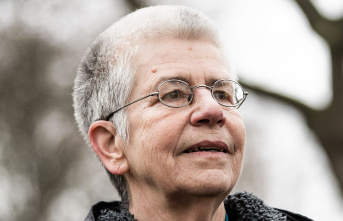"Mom, what's it like when you're dead?", "Dad, what does it mean when someone dies?" When children suddenly ask such questions, parents are often speechless. The uncertainty as to whether and how to talk to the child about this supposedly difficult topic is too great. "You should definitely talk about it. And openly and honestly," says Susanne Hövelmann, a social worker, educator and bereavement counselor from Dortmund, who runs a group for bereaved children with her husband.
Children can face death from a very young age. This could be a death in the family, a pet that has passed away, a dead earthworm that the child discovers on the street, or a scene on TV. In the beginning, children are curious, says the expert. They want answers to their questions and are neutral about death. The concerns that children could get scared are mostly unfounded and "reflect the fear of adults," explains the 57-year-old. "Many parents try to keep everything away from the child," reports the educator from her many years of experience with grieving families. But you can talk to your offspring about death from an early age.
How exactly a child perceives death depends on the individual stage of development, which can be roughly determined by the age of the child. Even an infant can already perceive the changed atmosphere when a person dies in the immediate vicinity. "Above all, they feel the loss of their mother very strongly," says the grief counselor. When children are about two years old, what Susanne Hövelmann calls "magical thinking" begins: They believe that the dead can come back. At this age most children ask about death for the first time. If they haven't had contact with a death yet, parents can "start with animals dying," the expert advises. Picture books are suitable for this, of which there is now a large selection.
However, if children have experienced death, "they understand very quickly that someone has died," says Susanne Hövelmann. They also understand that the person cannot come back, but struggle to understand the reason for death. Some children believe that they could be responsible "because they think, for example, that they weren't nice enough to their grandparents," explains the teacher. It is therefore important for parents to make it clear to the child that it is not their fault. From about the age of seven, children understand death better, but often do not want to accept it or still see it as a temporary condition.
From the age of ten, children understand the finitude that comes with the end of life and know that death can affect all living beings. But they often find it difficult to deal with. Regardless of age, honesty should always come first when talking to the child. Mothers and fathers should explain to their offspring very directly - in language appropriate to their age and child - what death means: that the deceased will not return. The parents should convey safety and security, signal that the child can talk to them about anything. "And take the children's feelings seriously," emphasizes the 57-year-old.
For example, if you want to know where the deceased is going, you can first ask the children what they think about it. "If the ideas are positive, you should leave them to the child and not impose your own views on them," says Susanne Hövelmann. "After all, we adults don't know what comes after death either." She remembers a boy from her grief group whose late father was a Schalke fan. "Dad now has a thousand soccer fields," was his idea of the afterlife. "That's how it will be. You knew Papa best," replied the social worker.
Phrases like "the dead man is asleep" or "dad is on vacation", with which some parents try to avoid the topic, "do not work at all", emphasizes the grief counselor. Because children think figuratively and take these statements literally. They then believe that their father no longer loves them because he is not coming back from the "journey". Or they develop problems falling asleep because they are afraid of dying themselves while they sleep. The biggest mistake is to ignore death and not talk about it at all. Some parents believe that children do not notice a death in the area. "That's a fallacy, because children get more than you think," explains the Dortmund native. "But out of consideration for the parents, they don't say anything."
You should include the children, even in your own grief. Children sense their feelings even when adults try to hide them, says Susanne Hövelmann. Parents should be open about their grief and explain the reason for the emotions. They should also teach the child that everyone grieves differently and that any type of grief reaction is okay. If it is a death that also affects the child, parents should keep a close eye on the offspring. Because it often seems that children hardly mourn. "But they often don't show it because they're afraid for the adults," explains the expert. When children suddenly withdraw, parents should be cautious in speaking out to them.
Because adults can take care of themselves and get help if needed. Children, on the other hand, depend on their parents. "Children are better able to open up to grief, but they can just as well take a break," said the 57-year-old. In order to switch off from grief, children usually immerse themselves in play. The educator thinks that adults could learn from the children on this point. If there is an upcoming funeral, explain to the child what exactly is going to happen and ask if they would like to come with you. If the child agrees, it is advisable "to have someone with you who was not so close to the deceased that they can take the child away from the funeral if necessary". But if the child says no, you should definitely not take them with you.
Rituals can help to support the offspring in processing the grief. "Write a letter, let a balloon rise, light tea lights," lists the social worker. And - especially important - "talk about the feelings and the grief". In our society, these are still issues that tend to be ignored. "We have to work on finally overcoming that," emphasizes the expert. It starts with children: "There are no taboos for children, they only get that from the adults."
Children sense their parents' unease and fear when it comes to death—and adopt that anxious attitude if not discussed with them. The children's interest could even be food for thought for adults. "Parents should take the child's curiosity as an opportunity to reconsider their own attitude towards death."












